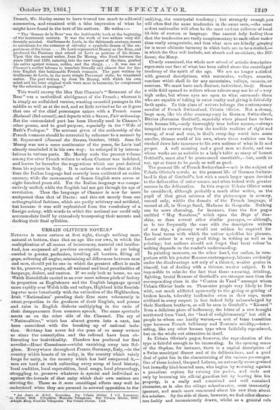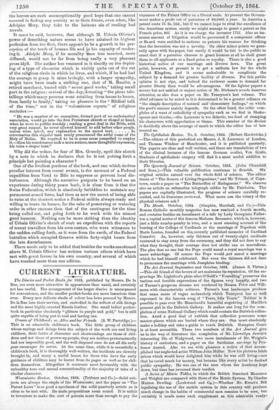URBAIN OLIVIER'S NOVELS:*
Nortusle is more curious at first sight, though nothing more natural at bottom, than that an age like our own, in which the multiplication of all means of intercourse, material and intellec- tual, has surpassed all previous conception, and is yet being carried to greater perfection, levelling all barriers, filling all gaps, softening all angles, minimizing all differences between man and man, should yet be one in which the greatest effort is made to fix, preserve, perpetuate, all national and local peculiarities Of language, dialect, and custom. If we only look at home, we see Welsh Eisteddfods carried to an ever more solemn pitch of foolery in proportion as Englishmen and the English language spread snore rapidly over Welsh hills and valleys, Highland kilts flourish- ing ever more luxuriantly with the extinction of the Highlanders, Irish "Nationalists" parading their Erse more vehemently in exact proportion to the goodness of their English, and poems and tales in English dialects multiplying in the ratio of their disappearance from common speech. The same spectacle meets us on the other side of the Channel. The cry of 4tNationalities," which has almost grown into a cant, has been coincident with the breaking up of national isola- tion. Brittany has never fed the pens of so many writers as since the conscription and the railroad have been ob- literating her individuality. Flanders has produced her first novelist—Henri Conscience—whilst vanishing away into Bel- gium. Everywhere throughout France, Germany, Italy,—in the country which boasts of its unity, in the country which vainly longs for unity, in the country which has half conquered it,— men are hard at work collecting every scrap of local history, local tradition, local superstition, local usage, local phraseology, struggling to preserve whatever is special and individual as against the inroads of that unity which their own nations are striving for. These as it were centrifugal efforts may well be understood when they are pursued in avowed opposition to the Les Jeers de &lei'. Nuuvelles. Par Urbain Olivier. 1 vol. Idusanne, .11. Bridal, 1882. L'OrpheUn. Nouvelle Villageoise. Par Urbain Olivier, 1883. More, Nouvelle Villageoise. Par Urban Olivier. last. unifying, the centripetal tendency ; but strangely enough you will often find the same tendencies in the same tuen,--the most ardent nationalist will often be the most curious collector of local
tit-bits of custom or language. One cannot help feeling thus that the tendencies are really complementary to each' other father
than really antagonistic, and that-what men are blindly „paying for is some ultimate harmony in which both are to be satisfied,-- in which the One will include, not absorb and annihilate, the Dif- ferent, the Many.
Closely examined, the whole new school of artistic description represents one face of what has been called above the centrifugal tendency of the spirit of the age. We are no longer s dieted with .general descriptions, with mountains, valleys, sunsets, sunrises which shall do for any mountains, valleys, suuaets, or sunrises. We must have each distinct, individual, itself. Hence a wide field opened to writers whose talents may not be of a very high order, but whose eyes are open to what surrounds them who are capable of taking in outer reality and giving it faithfully forth again. To this class of writers belongs the contemporary novelist of French Switzerland, Urbain Olivier. Not a strong, large man, like his elder contemporary in German Switzerland,
Bitziva (Jerernias Gottltelf), especially when placed face to face with human life,—only • thoroughly • true before nature,--always
tempted to swerve away from the terrible realities of tight and wrong, of weal and woe, in God's every.day world into some steelier, thinner world of his own, where those realities can be
stroked down into tameness to his own notions or what is fit and proper. A well meaning and a good man no doubt, and one whose works are as suitable to a lady's table as many of honest Gotthelf's, must tiles be pronounced unsuitable,--but, sooth- to say, apt at times to be goody as well as good.
The peasant life of French Switzerland—such is the subject of
Urbain Olivier's novels, as the peasant life of German witzer- 'midis that of' Gotthelf's, but with a much larger space devoted to the 'delineation of outer nature, and often indeed with greater success in the 'delineation. In this respact Urbain Olivier must be considered, although probably a much older writer, as the pupil of that great mistress of the picturesque in scenery, second only, within the domain of the French language, if second at all, to George Sand, Madame de Gssparin. Nothing can be more charming, for instance, than the few pages
entitled "'May -Sunshine," which open the Days e Sun- shine, or than several other similar ,paesages, —.although,
as is too frequently the case with the descriptive writers of our day, a glossary would not seldom be required for the local terms with which the author sprinkles his .plirases.
Local colour is a very good thing, in writing as well as in painting; but authors should not forget that local colour 'in writing depends on the reader's understanding.
In painting manners, on the other hanl, the author, in •corn- parison with his greater Barnese contemporary, labours evidently under the disadvantage not only of a thinner, weaker genius in himself, but of dealing with a thinner, weaker subject. It is impossible to mist:tke the fact that those swaying, drinking, fighting, brutal Bernese of Gotthelf's are stronger men than the correspon ding class in the "Canton de Vend" amongst whom Urbain Olivier leads us. 'Pleasanter people very likely to live with, not much addicted apparently to the giving or getting of broken 'heads, tolerably inoffensive even in their cups, more civilized in every respect (a fact indeed fully acknowledged by their Northern brethren, as will be seen in Gotthelrs " Kliserei " from a delicious piece of buffoonery, the letter of a cow brought northward from Vaud, the "land of enlightenment);" but still a people to whom one hardly wanns,—a sort of tame transition type between French brilliancy and Teutonic solidity,—inter- eating, like any other human type when faithfully reproduced, but on the whole not attractive in itself.
In Urbain Olivier's pages, however, the reproduction of the type is faithful enough to be interesting. In the opening scene of the Orphan, for instance, there is a capital description of a Swiss municipal dinner and of its deliberations, and a good deal of quiet fun in the characterizing of the various personages. One of these indeed, Gaspard Lebrun, an outwardly cross-grained but inwardly kind-hearted man, who begins by storming against a penniless orphan for ruining the pad th, and ends not only by becoming his official guardian but by leaving him his property, is a really well conceived and well attscained character, as is also the village schoolmaster, most inuoeently ignorant, and much more concerned about his cow than about his scholars. By the side of these, however, we find other &erec- ters feebly and inconsistently drawn, whilst as a general rule the heroes are such unexceptionably good boys that one cannot succeed in feeling any anxiety as to their future, even when, like Adolphe Mory, they take to the heinous sin of reading bad novels.
It must be said, however, that although M. Urbain Olivier's
power of describing nature seems to have attained its highest perfection from the first, there appeais to be a growth in his per- ception of the truth of human life and in his capacity of render- ing it. Adolphe Mary, if its morality were less inserted, more diffused, would not be far from being really a very pleasant
prose idyll. The author has ventured in it timidly on the depict- ing of a type of character which is visibly quite out of the rut of the religious circle in which he lives, and which, if he had had the courage to grasp it niore lovingly, with a larger sympathy, might have been made a striking one, that of M. Rauthe, a retired merchant, busied with "secret good works," taking small part in the religious revival of the day, detesting "the pions tale- tellings which many persons went retailing from house to house, from family to family," taking no pleasure in the "Biblical talk of the time," nor in the "voluminous reports" of religious societies :—
" He was 4 member of no committee, formed part of no ecclesiastical association, would go into the first Protestant church or chapel at hand, when he went to public worship ; reading a great deal in the Bible, with very great respect, he never allowed himself to add before other people, unless when asked, any explanation to the sacred text In conversation this singular man rarely pronounced the awful name of the Holy of Holies. He required to be in some sense compelled to employ it,—then his countenance took a more serious, more thoughtful expression, his voice a deeper tone."
Why did the writer, for fear of Mrs. Grundy, spoil this sketch by a note in which lie declares that he is not putting forth a principle but painting a character ?
One of the liveliest portions of the book, and one which derives peculiar interest from recent events, is the account of a Federal expedition from Vaud to Bale to suppress or prevent local dis- turbances. Although the narrative purports to be based on an 'experience dating thirty years back, it is clear from it that the Swiss Federation, which is absolutely forbidden to maintain any permanent armed force, had then as now the secret of being able to raise at the shortest notice a Federal militia always ready and willing to leave its homes, for the sake of preserving or restoring order in other cantons than that of the contingent for the time being called out, and going forth to its work with the utmost good humour. Nothing can be more striking than the identity of Urbain Olivier's sketch of such an expedition with the reports of recent travellers from his own canton, who were witnesses to the sudden calling forth, as it were from the earth, of the Federal battalion which occupied Geneva within forty-eight hours from the late disturbances.
-There needs only to he added that besides the works mentioned above M. Urbain Olivier has written various others which have met with great favour in his own country, and several of which have reached more than one edition.



































 Previous page
Previous page